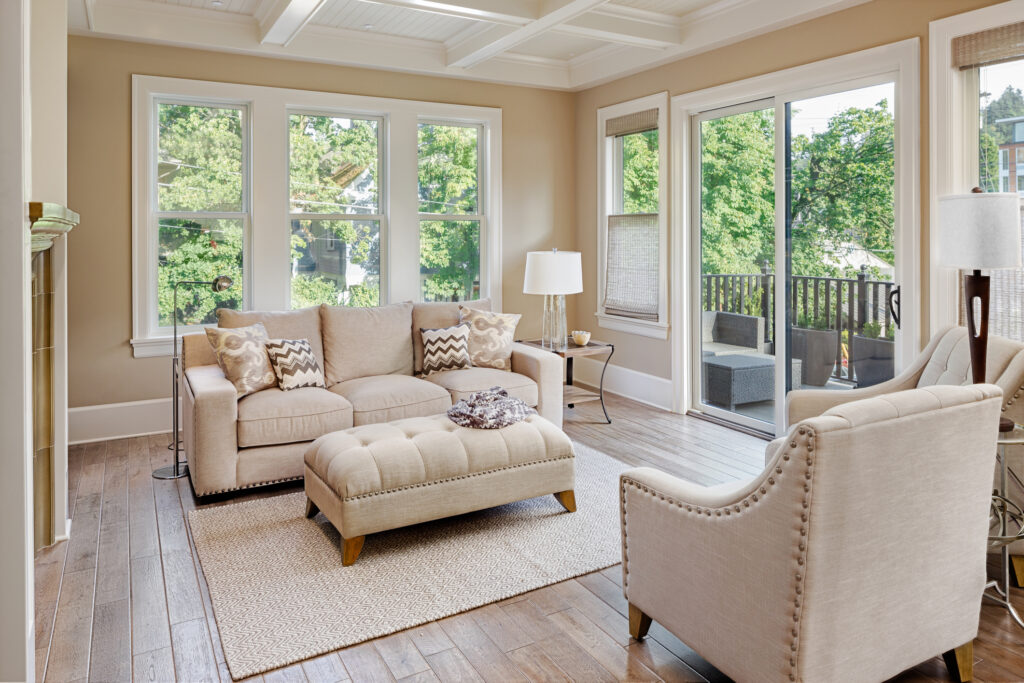
F.A.Q. about Windows
1. What are the benefits of replacing windows in my home?
Replacing windows in your home can offer several benefits. These include increased energy efficiency, reduced energy bills, improved noise reduction, enhanced home security, and an overall boost to your home’s aesthetic appeal.
2. How do I know it’s time to replace my windows?
You should consider replacing your windows if you notice any of the following signs:
- Drafts: If you feel a draft when standing near your windows, it may be time to replace them.
- High Energy Bills: Increased energy bills could be a sign that your windows are not providing adequate insulation.
- Difficulty Opening or Closing: If your windows are hard to open or close, they might need replacement.
- Condensation Between Glass Panes: This indicates that the seal between the panes has failed, allowing moisture to enter.
- Outside Noise: If you’re hearing more outside noise than usual, it could mean your windows are not providing adequate sound insulation.
3. What types of windows are available for my home?
There are several types of windows available for your home, including:
- Single-Hung Windows: These have a fixed top sash and a bottom sash that slides up to open.
- Double-Hung Windows: Both sashes (top and bottom) can slide up and down in these windows.
- Casement Windows: These windows are hinged on one side and open outward like a door.
- Picture Windows: These are large fixed windows that don’t open, typically used to maximize views.
- Bay Windows: These are multi-window units that protrude from the home and can include a seating area.
- Sliding Windows: These windows slide horizontally along a track.
4. How much does it cost to replace windows?
The cost to replace windows can vary greatly depending on several factors, including the type of window, size, materials, and installation costs. On average, a window replacement can cost between $575 and $1100 per window.
5. How can I improve the energy efficiency of my windows?
To improve the energy efficiency of your windows, consider the following:
- Choose windows with a low U-factor, which measures the rate of heat loss.
- Look for windows with a low solar heat gain coefficient (SHGC), which measures how much heat from the sun is transmitted through the window.
- Consider windows with multiple layers of glazing (double or triple-pane) and low-emissivity (Low-E) glass to improve insulation.
- Install weatherstripping around your windows to seal any gaps and prevent drafts.
6. How long does it take to install new windows?
The time it takes to install new windows can vary depending on the number of windows being replaced and the complexity of the installation. On average, a professional can install one window in about 30 minutes to an hour. For a whole house, the installation could take anywhere from a day to several days.
7. Can I replace my windows myself?
While it is possible to replace your windows yourself, it is a task best left to professionals unless you have significant home improvement experience. Improperly installed windows can lead to problems such as drafts, leaks, and reduced energy efficiency.
8. What should I look for when choosing a window installer?
When choosing a window installer, consider the following:
- Experience: Look for a company that has a proven track record and experience in installing the type of windows you want.
- Reputation: Check reviews and ask for references to ensure the company is reliable and provides quality work.
- Warranty: Ensure the company offers a warranty on their workmanship and the windows themselves.
- Licensing and Insurance: Verify that the company is licensed and insured.
9. How do I maintain my new windows?
Maintaining your new windows can help ensure they last longer and continue to operate efficiently. Here are some tips:
- Regularly clean your windows, both the glass and the frames.
- Inspect the seals and weatherstripping for any signs of wear and tear, and replace as needed.
- Lubricate moving parts such as hinges and locks to ensure smooth operation.
- Check for any signs of damage or deterioration, and address issues promptly.
10. How long do windows last?
The lifespan of a window can vary depending on the quality of the window, the materials used, and how well it is maintained. On average, windows can last anywhere from 15 to 30 years or more.
